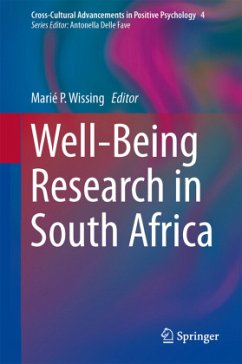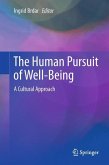Well-Being Research in South Africa
Herausgegeben:Wissing, Marie P.
Well-Being Research in South Africa
Herausgegeben:Wissing, Marie P.
- Gebundenes Buch
- Merkliste
- Auf die Merkliste
- Bewerten Bewerten
- Teilen
- Produkt teilen
- Produkterinnerung
- Produkterinnerung
This is the first book to bring together examples of research in positive psychology and psychofortology conducted in the multi-cultural South African context with its diverse populations and settings. Basic and applied research support some universality assumptions, but also showed unique cultural patterns. It provides a human diversity model that broadens the focus of culture beyond that of ethnic and racial issues, to also include groups with unique characteristics, strengths, histories and disparate socio-demographic features. The nature and dynamics of protective factors, assets,…mehr
Andere Kunden interessierten sich auch für
![The Human Pursuit of Well-Being The Human Pursuit of Well-Being]() The Human Pursuit of Well-Being81,99 €
The Human Pursuit of Well-Being81,99 €![Internationalizing the Psychology Curriculum in the United States Internationalizing the Psychology Curriculum in the United States]() Internationalizing the Psychology Curriculum in the United States77,99 €
Internationalizing the Psychology Curriculum in the United States77,99 €![Sozialpsychologie für Bachelor Sozialpsychologie für Bachelor]() Peter FischerSozialpsychologie für Bachelor34,99 €
Peter FischerSozialpsychologie für Bachelor34,99 €![Lew Vygotskij. Ausgewählte Schriften Lew Vygotskij. Ausgewählte Schriften]() Lew Vygotskij. Ausgewählte SchriftenLew Vygotskij. Ausgewählte Schriften35,00 €
Lew Vygotskij. Ausgewählte SchriftenLew Vygotskij. Ausgewählte Schriften35,00 €![Cultural Psychology Cultural Psychology]() Steven J. HeineCultural Psychology58,99 €
Steven J. HeineCultural Psychology58,99 €![Typen und Schichten: Zur Einteilung des Menschen und seiner Produkte Typen und Schichten: Zur Einteilung des Menschen und seiner Produkte]() Wolfgang RuttkowskiTypen und Schichten: Zur Einteilung des Menschen und seiner Produkte49,90 €
Wolfgang RuttkowskiTypen und Schichten: Zur Einteilung des Menschen und seiner Produkte49,90 €![Anti-Poverty Psychology Anti-Poverty Psychology]() Stuart C. CarrAnti-Poverty Psychology77,99 €
Stuart C. CarrAnti-Poverty Psychology77,99 €-
-
-
This is the first book to bring together examples of research in positive psychology and psychofortology conducted in the multi-cultural South African context with its diverse populations and settings. Basic and applied research support some universality assumptions, but also showed unique cultural patterns. It provides a human diversity model that broadens the focus of culture beyond that of ethnic and racial issues, to also include groups with unique characteristics, strengths, histories and disparate socio-demographic features. The nature and dynamics of protective factors, assets, resources and strengths are explored in educational, work, health, geographic and community contexts, and the magnitude and equivalence of constructs developed in a western context are evaluated in multicultural groups. It is a valuable resource for scholars and those interested in further research and culture sensitive application of positive psychology in various contexts and domains of life.
Produktdetails
- Produktdetails
- Cross-Cultural Advancements in Positive Psychology 4
- Verlag: Springer / Springer Netherlands
- Artikelnr. des Verlages: 80013037, 978-94-007-6367-8
- 2013
- Seitenzahl: 656
- Erscheinungstermin: 31. Mai 2013
- Englisch
- Abmessung: 241mm x 160mm x 40mm
- Gewicht: 1148g
- ISBN-13: 9789400763678
- ISBN-10: 9400763670
- Artikelnr.: 37057733
- Herstellerkennzeichnung Die Herstellerinformationen sind derzeit nicht verfügbar.
- Cross-Cultural Advancements in Positive Psychology 4
- Verlag: Springer / Springer Netherlands
- Artikelnr. des Verlages: 80013037, 978-94-007-6367-8
- 2013
- Seitenzahl: 656
- Erscheinungstermin: 31. Mai 2013
- Englisch
- Abmessung: 241mm x 160mm x 40mm
- Gewicht: 1148g
- ISBN-13: 9789400763678
- ISBN-10: 9400763670
- Artikelnr.: 37057733
- Herstellerkennzeichnung Die Herstellerinformationen sind derzeit nicht verfügbar.
Marié Wissing is professor of Psychology in the School for Psychosocial Behavioral Sciences at the North-West University, Potchefstroom, South Africa. Her research interests are the understanding, measurement and promotion of psychological well-being and strengths in the context of bio-psycho-social health. As a member of the Africa Unit for Transdisciplinary Health Research (AUTHeR) she participates as leader of the psychology team in multi-disciplinary research projects. She developed a research program in psychofortology (i. e. the science of psychological strengths) which includes several team research projects that focus on the exploration of the nature, patterns, dynamics and enhancement of psychological well-being in various contexts. Her current research projects focus on the exploration of patterns of psychological well-being in cultural context, and on the prevalence of various levels of mental health and its association with bio-markers, socio-demographic factors and predictors of health behaviours, with a view to inform health promotion strategies. She developed several curricula for teaching of Positive Psychology in South Africa. She is an NRF (National Research Foundation) rated researcher; was a visiting professor and invited lecturer at several universities in South Africa and Europe, and serves on the editorial boards of disciplinary journals. She received the Stals prize for Psychology in 2003 from the South African Academy of Science and Art, and a reward for contribution to work wellness in 2004 at the South African Work Wellness Conference. She initiated and co-led the First South African Positive Psychology Conference in 2006. She is a member of the Board of Directors of the International Positive Psychology Association (IPPA), and has served on the scientific committees of several international conferences.
Contributors.- Preface.- Chapter 1. Introduction; Marié P. Wissing.- Chapter 2. Toward Fortigenesis and Fortology: An Informed Essay; Deodandus J. W. Strumpfer.- Chapter 3. Positive Psychology and Education; Irma Eloff.- Chapter 4. Life Design: An Approach to Managing Diversity in South Africa; Jacobus G. Maree.- Chapter 5. Teacher Pathways to Resilience: Interpretations of Teacher Adjustment to HIV/AIDS-related Challenges; Linda Theron.- Chapter 6. Building generative theory from case work: The relationship-resourced resilience model; Liesel Ebersohn.- Chapter 7. From Happiness to Flourishing at Work: A Southern African Perspective; Sebastiaan Rothmann.- Chapter 8. Resilience and Thriving among Health Professionals; Henriëtte van den Berg.- Chapter 9. Measuring Happiness: Results of a Cross-National Study; Sebastiaan Rothmann.- Chapter 10. Further validation of the General Psychological Well-being Scale among a Setswana-speaking group; Itumeleng P. Khumalo, Q. Michael Temane and Marié P. Wissing.- Chapter 11. Feeling Good, Functioning Well and Being True: Reflections on Selected Findings from the FORT Research Programme; Marié P. Wissing and Michael Temane.- Chapter 12. Coping and Cultural Context: Implications for Psychological Health and Well-being; Marelize Willers, Johan C. Potgieter, Itumeleng P. Khumalo, Leoné Malan, Paul J. Mentz, and Suria Ellis.- Chapter 13. Aspects of Family Resilience in Various Groups of South African Families; Abraham P. Greeff.- Chapter 14. Psychological Well-being, Physical Health, and the Quality of Life of a Group of Farm Workers in South Africa: The FLAGH study; Sammy, M. Thekiso, Karel, F. H. Botha, Marié P. Wissing and Annamarie Kruger.- Chapter 15. The Pivotal Role of Social Support in the Well-being of Adolescents; Henriëtte S. Van den Berg, Ancel A. George, Edwin D. Du Plessis, Anja Botha, Natasha Basson, Marisa De Villiers and Solomon Makola.- Chapter 16. Older Adults' Coping with Adversities in anAfrican Context: A Spiritually Informed Relational Perspective; Vera Roos.- Chapter 17. Asset-based Coping as One Way of Dealing with Vulnerability; Ronél Ferreira.- Chapter 18.Relational Coping Strategies of Older Adults with Drought in a Rural African Context; Vera Roos, Shingairai Chigeza and Dewald van Niekerk.- Chapter 19. The Stories of Resilience in a Group of Professional Nurses in South Africa; Magdalene P Koen, Chrizanne van Eeden, Marié Wissing and Vicki Koen.- Chapter 20. Psychosocial Health: Disparities between Urban and Rural Communities; Marié P. Wissing, Q. Michael Temane, Itumeleng P. Khumalo, Annamarie Kruger and Hester H.Vorster.- Chapter 21. Multi-cultural differences in hope and goal-achievement; David J. F. Maree and Marinda Maree.- Chapter 22. The Role of Gender and Race in Sense of Coherence and Hope Orientation Results; Sanet van der Westhuizen (née Coetzee), Marié de Beer and Nomfusi Bekwa.- Chapter 23. Self-Regulation as Psychological Strength in South Africa: A Review; Karel Botha.- Chapter 24. Commitment as an identity-level regulatory process in academic and interpersonal contexts; Salomé Human-Vogel.- Chapter 25. Facilitating psychological well-being through hypnotherapeutic interventions; Tharina Guse and Gerda Fourie.- Chapter 26. Positive Psychology and Subclinical Eating Disorders; Doret Kirsten and Wynand F. Du Plessis.- Chapter 27. Evaluation of a Programme to Enhance Flourishing in Adolescents; Izanette Van Schalkwyk and Marié P. Wissing.- Chapter 28. Conclusions and Challenges for Further Research; Marié P. Wissing.
Contributors.- Preface.- Chapter 1. Introduction; Marié P. Wissing.- Chapter 2. Toward Fortigenesis and Fortology: An Informed Essay; Deodandus J. W. Strumpfer.- Chapter 3. Positive Psychology and Education; Irma Eloff.- Chapter 4. Life Design: An Approach to Managing Diversity in South Africa; Jacobus G. Maree.- Chapter 5. Teacher Pathways to Resilience: Interpretations of Teacher Adjustment to HIV/AIDS-related Challenges; Linda Theron.- Chapter 6. Building generative theory from case work: The relationship-resourced resilience model; Liesel Ebersohn.- Chapter 7. From Happiness to Flourishing at Work: A Southern African Perspective; Sebastiaan Rothmann.- Chapter 8. Resilience and Thriving among Health Professionals; Henriëtte van den Berg.- Chapter 9. Measuring Happiness: Results of a Cross-National Study; Sebastiaan Rothmann.- Chapter 10. Further validation of the General Psychological Well-being Scale among a Setswana-speaking group; Itumeleng P. Khumalo, Q. Michael Temane and Marié P. Wissing.- Chapter 11. Feeling Good, Functioning Well and Being True: Reflections on Selected Findings from the FORT Research Programme; Marié P. Wissing and Michael Temane.- Chapter 12. Coping and Cultural Context: Implications for Psychological Health and Well-being; Marelize Willers, Johan C. Potgieter, Itumeleng P. Khumalo, Leoné Malan, Paul J. Mentz, and Suria Ellis.- Chapter 13. Aspects of Family Resilience in Various Groups of South African Families; Abraham P. Greeff.- Chapter 14. Psychological Well-being, Physical Health, and the Quality of Life of a Group of Farm Workers in South Africa: The FLAGH study; Sammy, M. Thekiso, Karel, F. H. Botha, Marié P. Wissing and Annamarie Kruger.- Chapter 15. The Pivotal Role of Social Support in the Well-being of Adolescents; Henriëtte S. Van den Berg, Ancel A. George, Edwin D. Du Plessis, Anja Botha, Natasha Basson, Marisa De Villiers and Solomon Makola.- Chapter 16. Older Adults' Coping with Adversities in anAfrican Context: A Spiritually Informed Relational Perspective; Vera Roos.- Chapter 17. Asset-based Coping as One Way of Dealing with Vulnerability; Ronél Ferreira.- Chapter 18.Relational Coping Strategies of Older Adults with Drought in a Rural African Context; Vera Roos, Shingairai Chigeza and Dewald van Niekerk.- Chapter 19. The Stories of Resilience in a Group of Professional Nurses in South Africa; Magdalene P Koen, Chrizanne van Eeden, Marié Wissing and Vicki Koen.- Chapter 20. Psychosocial Health: Disparities between Urban and Rural Communities; Marié P. Wissing, Q. Michael Temane, Itumeleng P. Khumalo, Annamarie Kruger and Hester H.Vorster.- Chapter 21. Multi-cultural differences in hope and goal-achievement; David J. F. Maree and Marinda Maree.- Chapter 22. The Role of Gender and Race in Sense of Coherence and Hope Orientation Results; Sanet van der Westhuizen (née Coetzee), Marié de Beer and Nomfusi Bekwa.- Chapter 23. Self-Regulation as Psychological Strength in South Africa: A Review; Karel Botha.- Chapter 24. Commitment as an identity-level regulatory process in academic and interpersonal contexts; Salomé Human-Vogel.- Chapter 25. Facilitating psychological well-being through hypnotherapeutic interventions; Tharina Guse and Gerda Fourie.- Chapter 26. Positive Psychology and Subclinical Eating Disorders; Doret Kirsten and Wynand F. Du Plessis.- Chapter 27. Evaluation of a Programme to Enhance Flourishing in Adolescents; Izanette Van Schalkwyk and Marié P. Wissing.- Chapter 28. Conclusions and Challenges for Further Research; Marié P. Wissing.








